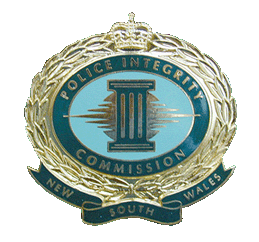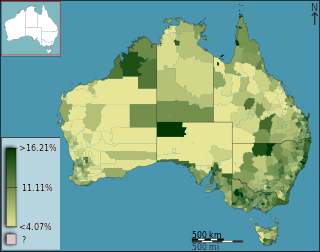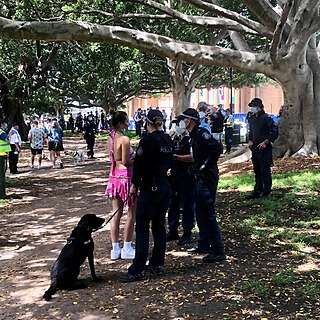Related Research Articles

A Taser is a conducted energy device (CED) primarily used to incapacitate people, allowing them to be approached and handled in an unresisting and thus safe manner. Sold by Axon, formerly TASER International, the device fires two small barbed darts intended to puncture the skin and remain attached to the target, at 55 m/s. Their range extends from 4.5 m (15 ft) for non-Law Enforcement Tasers to 10.5 m (34 ft) for Law Enforcement Tasers. The darts are connected to the main unit by thin insulated copper wire and deliver a modulated electric current designed to disrupt voluntary control of muscles, causing "neuromuscular incapacitation." The effects of a taser may only be localized pain or strong involuntary long muscle contractions, based on the mode of use and connectivity of the darts.

An electroshock weapon is an incapacitating weapon. It delivers an electric shock aimed at temporarily disrupting muscle functions and/or inflicting pain without usually causing significant injury.

The New South Wales Police Force is a law enforcement agency of the state of New South Wales, Australia, established in 1862. With more than 18,000 police, it is the largest police organisation in Australia, policing an area of 801,600 square kilometres with a population of more than 8.2 million people.
In Australia, long service leave (LSL) is a period of additional paid leave granted to employees who have completed an extended period of service with an employer. Under Australian law, most employees are entitled to long service leave if they work for the same employer for a prolonged length of time, the threshold usually being between seven and ten years. Long service leave is separate from annual leave; employees receiving long service leave continue to accrue annual leave as normal and, at a minimum, as prescribed by the National Employment Standards.

The Police Integrity Commission, was a statutory corporation of the New South Wales Government, responsible for the prevention, detection, and investigation of alleged serious misconduct in the Police Force in the state of New South Wales, Australia. The mission of the commission was to be an effective agent in the reduction of serious police misconduct. On 1 July 2017, the Police Integrity Commission was abolished and replaced by the Law Enforcement Conduct Commission.

Transit Officers were the security and fare compliance function for RailCorp train services in New South Wales, Australia. Transit Officers conducted uniformed and plainclothes patrols on CityRail and CountryLink train services and assigned to ensure the security of passengers, staff and rail property. The position was created in 2002 after a report found that rail security required more authority than possessed by the Chubb Security security guards contracted by RailCorp. Previous figures showed that over 600 Transit Officers had been engaged, however the number was reduced to 150.
Social security, in Australia, refers to a system of social welfare payments provided by Australian Government to eligible Australian citizens, permanent residents, and limited international visitors. These payments are almost always administered by Centrelink, a program of Services Australia. In Australia, most payments are means tested.
In the United Kingdom police firearm policy varies by constituent countries. In Northern Ireland, all police officers carry firearms whereas in the rest of the United Kingdom, firearms are carried only by specially-trained firearms officers. The arming of police in Great Britain is a much debated topic.

Taser safety issues relate to the lethality of the Taser. The TASER device is a less-lethal, not non-lethal, weapon, since the possibility of serious injury or death exists whenever the weapon is deployed. It is a brand of conducted electroshock weapon sold by Axon, formerly TASER International. Axon has identified increased risk in repeated, extended, or continuous exposure to the weapon; the Police Executive Research Forum says that total exposure should not exceed 15 seconds.

Health care in Australia operates under a shared public-private model underpinned by the Medicare system, the national single-payer funding model. State and territory governments operate public health facilities where eligible patients receive care free of charge. Primary health services, such as GP clinics, are privately owned in most situations, but attract Medicare rebates. Australian citizens, permanent residents, and some visitors and visa holders are eligible for health services under the Medicare system. Individuals are encouraged through tax surcharges to purchase health insurance to cover services offered in the private sector, and further fund health care.

The Police Service Amendment Act 1992 was an Act of the Parliament of New South Wales, Australia, establishing a trial of volunteer police officers in the New South Wales Police Service. Introduced to the Parliament by the Liberal Government, the Act was strongly opposed by the Labor Opposition and the New South Wales Police Association.
Ombudsmen in Australia are independent agencies who assist when a dispute arises between individuals and industry bodies or government agencies. Government ombudsman services are free to the public, like many other ombudsman and dispute resolution services, and are a means of resolving disputes outside of the court systems. Australia has an ombudsman assigned for each state; as well as an ombudsman for the Commonwealth of Australia. As laws differ between states just one process, or policy, cannot be used across the Commonwealth. All government bodies are within the jurisdiction of the ombudsman.
The Japanese National Pension is a pension system that all registered residents of Japan, both Japanese and foreign, are required to enroll in. Since January 1, 2010, it has been managed by the Japan Pension Service.
Home Office Circular 46/2004 is guidance issued by the Home Office. Annex C of the circular addresses matters concerning the review of police injury pensions.
Adam Salter was shot and killed in his Sydney home in November 2009 after police responded to a call that the 36-year-old was stabbing himself with a knife. He was shot in the back by a New South Wales Police Sergeant Sheree Bissett who yelled "Taser, Taser, Taser" before discharging her gun. The shooter later claimed that Salter was threatening another officer with the knife and that lethal force was her only option. However, the coroner found that there was strong evidence that the policewoman mistakenly used her gun instead of her taser.
Roberto Laudisio Curti, known as Beto Laudisio, was a 21-year-old man from São Paulo, Brazil. He died on 18 March 2012 after being pursued, tackled, tasered, sprayed with OC spray, and physically compressed under the weight of multiple police officers of the New South Wales Police Force in Sydney, Australia.
Pat Stogran is a retired Colonel of the Canadian Forces Princess Patricia's Canadian Light Infantry (PPCLI) and was Canada's first Veteran's Ombudsman. In 2010, Stogran criticized the Conservative government's choice to enforce the New Veterans Charter, which was signed into law by the previous Liberal government in 2005 after approval by all parties. Among other changes, it took away veterans' disability pensions in favour of a one-time lump sum payment.
Naguib "Nick" Kaldas APM is a former Australian police officer and former deputy commissioner of the New South Wales Police Force. Though considered to be a possible future Commissioner, in March 2016 Kaldas announced his decision to leave the Police Force and currently works for the United Nations.

The Law Enforcement (Powers and Responsibilities) Act 2002(NSW) is an Act of the Parliament of New South Wales which governs the exercise of specific police powers in New South Wales. It

The New South Wales Police Force strip search scandal refers to an ongoing policing scandal surrounding the routine and arbitrary use of strip searches by members of the New South Wales Police Force.
References
- ↑ Police Association of NSW Archived 2012-07-06 at the Wayback Machine - History
- 1 2 Ombudsman slams police for needless use of Tasers by Anna Patty (Sydney Morning Herald, 24 October 2012)
- ↑ NSW Ombudsman calls for Taser overhaul by Vincent Morello (Sydney Morning Herald, 23 October 2012)
- ↑ NSW police officers paid almost $1 million each to quit force under deal struck with O'Farrell government by Barclay Crawford (The Sunday Telegraph, 12 February 2012)